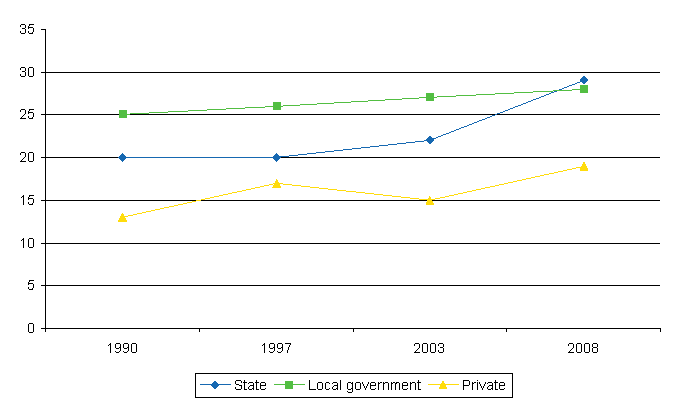Published: 16 December 2008
Problems in working conditions have increased in local and central government
The latest Quality of work life survey, which was conducted in 2008, describes the changes that have taken place in working conditions during the past 30 years. Positive changes have been observed in the possibilities of learning and development at work and as an increase in the variety of tasks. Negative developments include an increase in problems related to time pressure, the insecurity of the employment relationship and social relationships. These negative developments have been observed especially in the public sector.
For three decades already Statistics Finland has been conducting extensive interview-based work life surveys which describe the varied changes in employees' working conditions. Among the most notable negative changes is the increase in time pressure and insecurity observed since the late 1980s. The relationship between work and free time has also become blurred. As workplaces also emphasise individual work performance and competition is increasing, social relationships and collaboration suffer.
Time pressure, insufficient personnel, uncertainty about the future and a lack of openness have all increased especially in the public sector. Negative developments started to appear in the local government sector as from the recession of the 1990s, but according to the latest survey, the 2000s have seen an increase in work life problems especially in the central government sector. Central government employees feel more often than they did before that there are not enough people to do the work. The openness of the work atmosphere and encouragement have also decreased. Central government employees are now more afraid of unforeseeable changes than employees in other sectors.
Figure 1. Too few personnel compared with tasks, fully agree, by employer sector

Source : Quality of work life surveys 1990-2008
Quality of work life surveys show that in many respects the past thirty years have also brought positive changes to Finnish working life. Not only are employees increasingly competent, but their opportunities of developing their skills at work and to receive training and education at work have also improved markedly. Tasks have become more varied and independent, and employees' possibilities of influencing different aspects of their work have improved. Employees see their work as important and significant more often than they used to.
Employees in Finland appreciate the contents of their work and the opportunities for development provided by their work significantly more than career advancement possibilities related to their work. Good social relationships, security and a long-term perspective are also very important aspects of work. Gainful employment is a rather significant part in the life of employees in Finland, and many would like to continue it in some form even after reaching retirement age.
Finland does well in international comparisons as regards low hierarchies, superior-subordinate discussions, application of IT and frequency of team work. Employees in Finland view their possibilities of development at work and of receiving training and education and influencing their tasks as better than employees in other European countries.
Source: Työolojen kolme vuosikymmentä. Työolotutkimusten tuloksia 1977-2008. Tilastokeskus (Three decades of working conditions. Results from quality of work life surveys 1977-2008. Statistics Finland)
Inquiries: Ms Anna-Maija Lehto +358 9 1734 3223, Ms Hanna Sutela +358 9 1734 2907
Director in charge: Ms Riitta Harala
- Tables
-
Tables in databases
Pick the data you need into tables, view the data as graphs, or download the data for your use.
Last updated 27.1.2009
Official Statistics of Finland (OSF):
Quality of work life [e-publication].
ISSN=2342-2890. 2008. Helsinki: Statistics Finland [referred: 10.3.2025].
Access method: http://stat.fi/til/tyoolot/2008/tyoolot_2008_2008-12-16_tie_001_en.html

